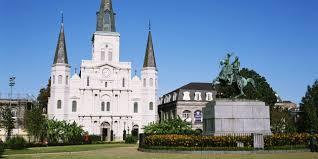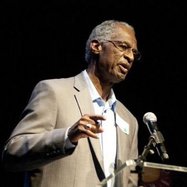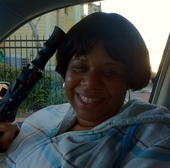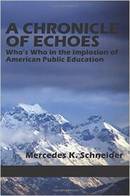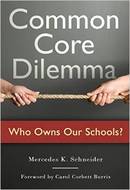On February 26, 2016, Jennifer Berkshire released this 20-minute audio interview with long-time school choice advocate, Howard Fuller. I have written about Fuller in my ed reform who's-who, A Chronicle of Echoes, for his involvement in founding the corporate reform vehicle, the Black Alliance for Educational Options (BAEO).
One of the prevailing questions about Fuller is the degree to which he is simply carrying out the wishes of funders such as the Walton Foundation as opposed to trying to use those funds to truly empower parents and communities. (I even hesitate to use the word, "empower," because it has long been co-opted by corporate reformers and pasted over their obvious top-down efforts to kill community schools in favor of under-regulated "choice" strategically placed just out of true control of those whom "choice" supposedly empowers.)
That noted, after hearing Fuller's interview with Berkshire regarding his assistance in helping native New Orleaneans form an actual grassroots organization, BENOLA- and after both an extensive formal interview with BENOLA founding member, Ashana Bigard, as well as another discussion with her over the phone in preparation for this post- it seems that Fuller is earnestly trying to help establish what has been grossly absent in the post-Katrina New Orleans state takeover: Involvement and investment by the New Orleans community itself.
Given Fuller's long-time Walton involvements, what makes Fuller's efforts to actually empower New Orleans community members particularly interesting is this October 2015 report announcing that the Walton Foundation 2016-20 strategic plan involves trying to drum up community support for its charter school reforms- and one city of particular focus is New Orleans. The Waltons have put the reforms in place and want to purchase a campaign to bring communities into line with supporting the Walton charter efforts. However, what Fuller appears to be trying to do is bring the Waltons (and other corporate reform investors) around to seeing that they should fund community groups and give those groups the freedom to make their own decisions- not to just toe the Walton-decided line.
On February 27, 2016, I transcribed Berkshire's interview with Fuller (that transcription can be found here: Berkshire-Fuller interview). In the remainder of this post, I present excerpts from the interview, which culminates in news of the formation of BENOLA and the upcoming release of the group's manifesto.
JB: I'm here to talk to you because New Orleans is sort of an experiment in urban education reform. You've been an advocate for school choice going back, now, decades, and I think a lot of people would expect that you would be in a place like New Orleans cheering it on, and in fact, something very interesting is happening, You're actually leading what might be described as a little bit of an uprising. Talk about, talk about what's going on. We're going to dig into that.
HF: Yes, you know, I, what it is, is that over the past, probably about, 16 months, I've really spent a lot of my personal time focused on New Orleans. And it started out by me sitting down and having one-on-ones with about, I'd say, about 20, ah, African Americans from different, you know, different sectors of this community. And I really asked them two questions: What do you think about education reform in New Orleans, and what do you think about black people's role in it?
The one overriding theme was, this has been done to us and not with us. ...
...The larger question is, What role has the black community played in making this happen? And the argument that I'm trying to make is that if there's a significant segment of the black community who feels, even if there are now things that are better, but they have not played a significant role in making it better, or they haven't played a significant role in the power relationships, or if you have significant numbers of people who see the effort to change education and the way that it's being done as a larger part of the disempowerment of black people in the city of New Orleans, even the good things that are happening, in my mind, they are, uh, there's a danger in the ability to sustain it if we, if we can't build on a broader base of support within the black community itself.
Plus you have, as you know, the whole issue of the 7,000 employees being fired, um, um, 4300 of them, I think, were black teachers. And so, that has left, a, a, a, a deep wound in this community, that even after ten years, has not been dealt with. ...
JB: Talk a little bit about the specific role that you see black teachers playing in this movement. Obviously, as you mentioned, the 7,000, the firing of the 7,000 employees remains a kind of unhealed wound, as you described it. Um, a, you clearly see black teachers playing a real leadership role, not just in their schools, but sort of across the, the education system. Talk about what that's going to look like and how you get there. [HF laughs]
HF: Yeah, well, I have a huge concern about the way in which black teachers have been dealt with. What happened was that when integration took place, a lot of black teachers lost their jobs. There was the lack of valuing the, the role of black teachers. And what I see is some analogy in the ed reform movement today because of the way that we've implemented it in a number of places, black teachers have lost their jobs. Black, the, the role that black teachers and the value that black teachers bring to the table is not appreciated--particularly veteran black teachers. ...
JB: You have a lot of big stuff planned in the coming months, ah, in New Orleans. You have an organization. Um, I, I heard a, a rumor that there's going to be some kind of a manifesto released. Ah, what, what should we be looking for to happen in New Orleans in the coming year?
HF: I, you know, I, I I've been working with a group of people to create an organization called BENOLA ("bee-nola"): Black Education for New Orleans, Louisiana. And, you know, it's been some really great people that, that are a part of this, and, um we're at the point where we're, we're actually going to become a, they're going to become a formal organization. I'm not, I'm not involved in it other than to be supportive and helpful...
JB: Because you're not from New Orleans.
HF: Because I'm not from New Orleans. This is going to be led by, controlled by, you know, people from New Orleans.
Education reform led and controlled by people from New Orleans.
It's about time.
***
Originally posted 02-28-16 at deutsch29.wordpress.com
Schneider is a southern Louisiana native, career teacher, trained researcher, and author of the ed reform whistle blower, A Chronicle of Echoes: Who's Who In the Implosion of American Public Education.
She also has a second book, Common Core Dilemma: Who Owns Our Schools?.

